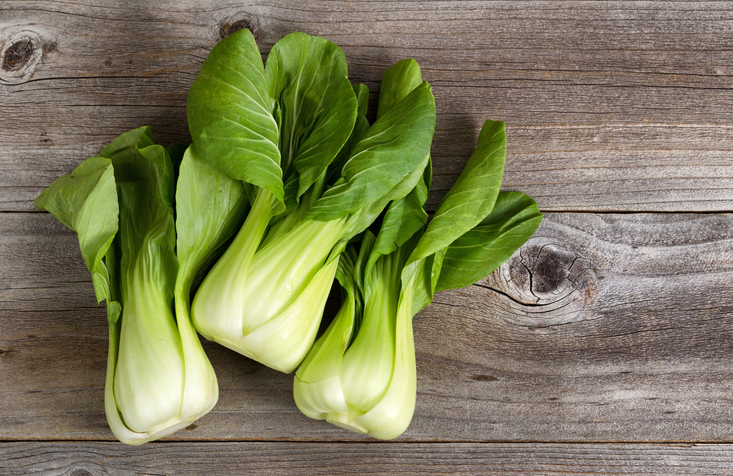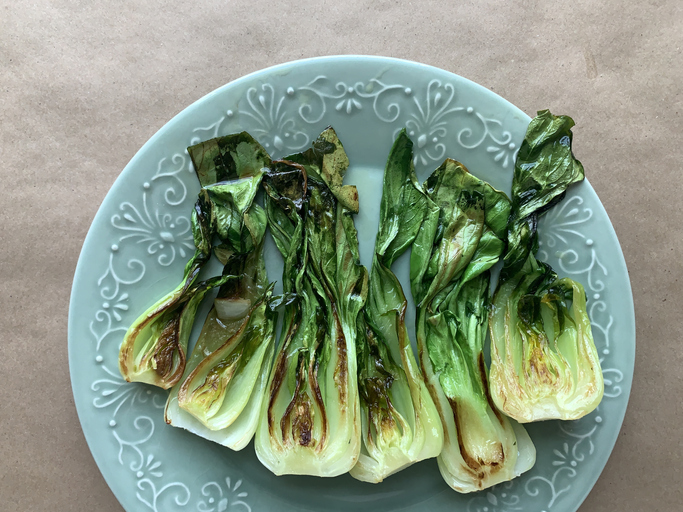5 Reasons You May Want to Make Bok Choy Your Go-To Veggie

By Joy Stephenson-Laws, J.D., Founder
Although I do not enjoy the taste of broccoli, I love pretty much every other green vegetable out there; asparagus, spinach, artichoke, green beans, arugula, okra - you name it. If I am not making a salad, asparagus and green beans are usually my go-tos, however, lately I’ve been switching it up with bok choy. Sometimes we need a break from our more basic vegetables in order to not get bored with our daily diet and fall back on junk foods for instant gratification.

Bok choy is a type of Chinese cabbage. It is a cruciferous vegetable which means it belongs to the same family as arugula, broccoli, Brussels sprouts, cauliflower, kale, radish and turnips. Bok choy is sometimes called “soup spoon” because of the shape of its leaves.
It is such an elegant looking vegetable (in my opinion). I like to buy baby bok choy, because they are just so manageable when I am cooking. Bok choy is very versatile. One of my favorite sides for dinner is so simple. I just wash and then slice some baby bok choy lengthwise and sear it in a hot cast iron skillet and season as I see fit. It’s so good in a marinade of avocado oil, a touch of sesame oil, soy sauce, honey, fresh ginger and garlic.
Potential health benefits of bok choy?- Bok choy may help with fat metabolism.
A recent study published by the National Institutes of Health (NIH) involved hamsters that were fed a high fat diet. Some of the hamsters supplemented with bok choy while others simply just consumed the high fat diet.
“In conclusion, different amounts of bok-choy added to the diets incredibly improved the lipid-profile, enhanced liver enzyme activities and related gene expression,” according to the study report.
The results suggested that bok choy may reduce fat accumulation in the body.
- Bok choy may help fight cancer.
Cruciferous veggies such as bok choy are known for their cancer-fighting properties.
“Cruciferous vegetables are a rich source of glucosinolates and their hydrolysis products, including indoles and isothiocyanates, and high intake of cruciferous vegetables has been associated with lower risk of lung and colorectal cancer in some epidemiological studies,” reports the NIH.
- Bok choy may help with bone health (especially if you are vegan).
It’s no secret that we all need calcium for healthy, strong bones. Bok choy is very rich in calcium making it a great veggie for anyone, but especially if you are vegan or prefer to not eat dairy products such as cheese, yogurt and milk. In addition to this, bok choy is rich in other bone health boosting nutrients such as magnesium, zinc and vitamin K.
- Bok choy may help lower blood pressure.
Along with being high in magnesium and calcium, bok choy is also a great source of potassium. These three nutrients are a powerful trifecta and all may lower blood pressure naturally.
- Bok choy may help you lose weight.
Not only is bok choy low calorie but it is also fiber and water rich, making it very filling. Eating foods such as bok choy may deter you from eating nutrient-void, calorie heavy processed foods. If you feel full and nourished, the less likely you will be to reach for those potato chips or cookies.
Additional ways to cook with bok choy.
Bok choy is commonly used in Chinese dishes and other Asian cuisines. I love the flavors of Asian cooking, and what better way to get a bunch of vegetables in a meal than doing a ginger, garlic veggie stir-fry with bok choy?
Also check out this bok choy soup with ginger garlic noodles.
Who should not eat bok choy?
As always, it is highly recommended that you consult a competent healthcare practitioner about the foods you include in your daily diet (especially if you have any existing health issues or are pregnant or breastfeeding). Because bok choy is very high in vitamin K, it can interfere with blood thinning medication. If you are taking a blood thinner, be sure to speak with your doctor before eating bok choy.
Enjoy your healthy life!
The pH professional health care team includes recognized experts from a variety of health care and related disciplines, including physicians, attorneys, nutritionists, nurses, and certified fitness instructors. This team also includes the members of the pH Medical Advisory Board, which constantly monitors all pH programs, products, and services. To learn more about the pH Medical Advisory Board, click here.







